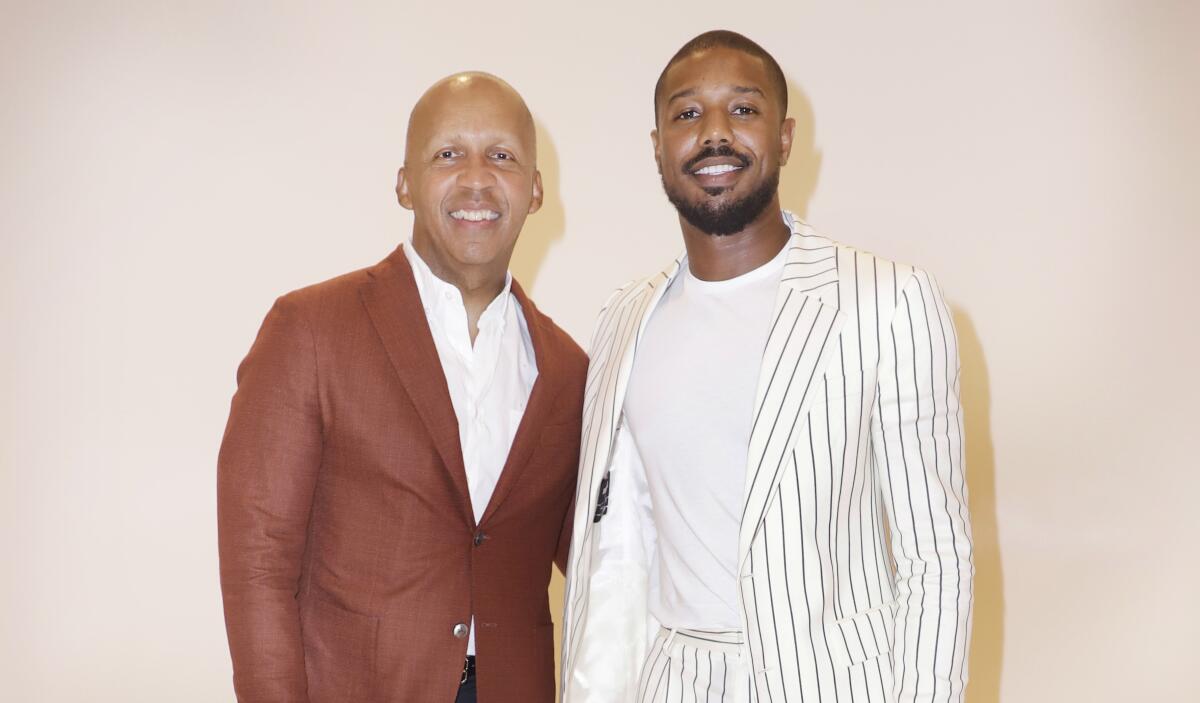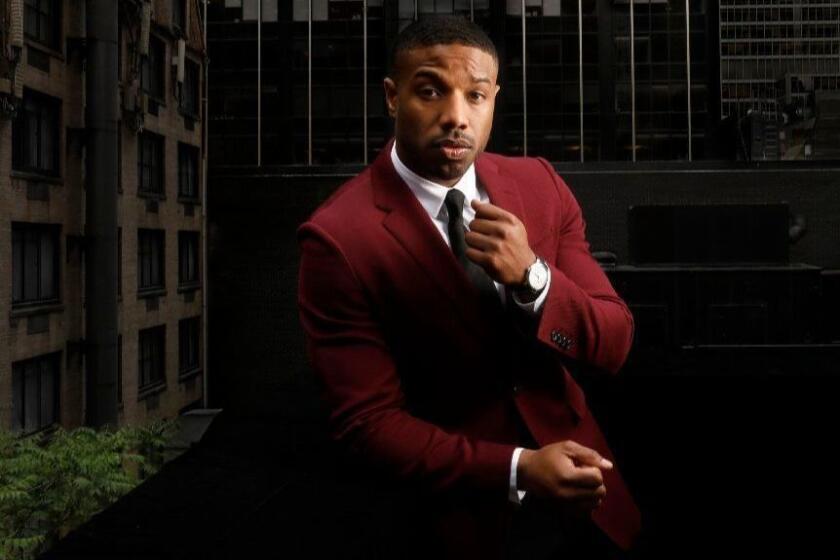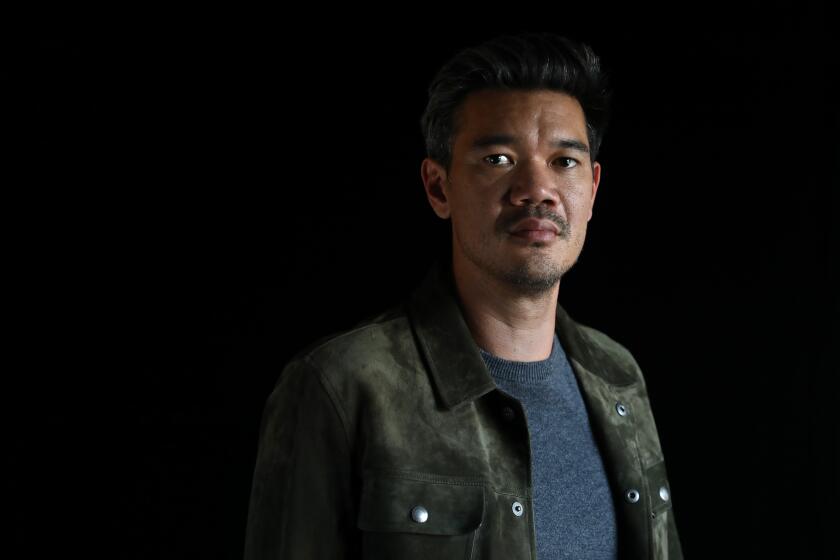How Michael B. Jordan and the real-life lawyer he plays in ‘Just Mercy’ hope to spark change

- Share via
Michael B. Jordan began studying Bryan Stevenson the first time they met, sneaking glances at the noted civil rights attorney whom he now plays in the true-life drama “Just Mercy.” How he spoke, how he drank his tea, any detail he could take in to better understand what makes Stevenson the person he is, a lawyer and activist devoted to righting systemic injustices and bringing humanity and change to the prison system.
“I was sizing him up the whole time,” Jordan said, flashing a megawatt smile at Stevenson as they sat, reunited, on a September day in Toronto, earning an amused grin in return. “I thought I was doing it without him noticing, but he told me he kind of felt it.”
They laughed, falling into an easy rhythm — the movie star and the lawyer, whose personal missions intertwine in “Just Mercy,” which opens nationwide Friday after a limited Christmas berth.
Jordan, 32, known for his roles as Oakland police-brutality victim Oscar Grant in “Fruitvale Station,” villain Erik Killmonger in “Black Panther” and boxer Adonis Creed in “Creed,” plays Stevenson in “Just Mercy” at a formative time in the jurist’s life, as an eager young lawyer whose calling is awakened as he represents condemned men and is confronted with injustice, corruption and racism.
Now 60, Stevenson is cofounder of the Equal Justice Initiative, a nonprofit that combats racial and economic inequity in the criminal justice system. In a 35-year career he’s saved 125 prisoners from death row, including condemned men whose cases and traumas are depicted with sensitivity in “Just Mercy.” He speaks passionately and urgently, but also with a sense of optimism.
Yet before he became a prominent advocate in the justice reform movement, one who inspired others to action in a viral TED Talk, Stevenson was the idealistic young lawyer we meet in the opening scenes of “Just Mercy,” — inexperienced, under-resourced and unprepared for the adversaries and obstacles that come his way as he sets out to represent death row inmates, mostly poor minorities, in the deep South.
Michael B. Jordan is crusading attorney Bryan Stevenson opposite Jamie Foxx, Brie Larson, Tim Blake Nelson and more in a drama of death row justice.
It is this Stevenson whom Jordan locates at a pivotal moment in his professional and emotional life. “Just Mercy,” directed by Destin Daniel Cretton (“Short Term 12”) and written by Cretton and Andrew Lanham, is based on Stevenson’s 2014 memoir of the same name. It tracks his career circa 1988, when as a 28-year-old attorney he took on the case of Walter McMillian, an African American man sentenced to die in Alabama for the murder of a white woman, despite his claims of innocence and dozens of witnesses corroborating his claim.
Through proximity to his first death row clients, Stevenson developed a deep sense of empathy for the humanity they were so often denied by the system. Most were disproportionately disadvantaged and many had no access to legal aid or were suffering under excessive punishments, largely discarded and forgotten by society.
His book became a bestseller but he realized that its message could reach even more people in film form. “I just wanted people to see what I’ve seen for the last 35 years,” Stevenson said in August in Los Angeles. “I’ve seen people crushed by inequality and injustice … and I just believe that my reactions are not unique.”
Open eyes
Jordan signed on to produce and star in the project after being introduced to Cretton by his “Black Panther” and “Fruitvale Station” director, Ryan Coogler. As an actor, “Just Mercy” presented new dramatic challenges. As a producer through his Outlier Society company, Jordan put his “inclusion rider” into practice, mandating a policy of inclusive hiring on the Warner Bros. release. He also recruited Jamie Foxx for a pivotal role in the passion project.
“Michael B. has that spirit where he kind of treats everybody the same, whether you’re an intern or a PA or the director or a producer,” said Cretton. “And that’s also the spirit of Bryan Stevenson, so he’s kind of the perfect person to play him.”
To throw his professional weight into getting “Just Mercy” made felt like “growth,” said Jordan. “I always wondered if I would be able to do it, if there was ever going to be a time when I would be in that position of having that power to get a movie greenlit, and to play by my production company’s rules, in the sense of having the inclusion rider. It was a first step for me — the first of many, hopefully.”
WarnerMedia, the parent company of Hollywood studio Warner Bros., announced Wednesday a company-wide policy aimed at increasing diversity and inclusion in front of and behind the camera.
He also felt a kinship with Stevenson and the roots of his empathy and activism. “I think growing up poor and inner-city, you’re naturally empathetic,” said Jordan, who grew up in Newark, N.J. “When you’re taught to care about family and to support one another, it’s an empathetic thing that you have for each other, and I think that’s where the roots of that started. Me feeling like I’m just a person who’s a part of the universe, I want to do my part to contribute to that.”
“I identify really strongly with that,” said Stevenson, who was raised in rural Delaware in the 1960s. “I also grew up in a really poor community and there was always somebody who had less than you had, and that gave you a consciousness about them.” Playing music in church as others shared testimonials of their own trials also cultivated in him a sensitivity to others, he added.
“It just opened your heart and your mind and your eyes to the needs of other people,” he said. “Once, as Michael says, you’re open to that, you can’t really turn it off. And I don’t want to turn it off. Some people try hard to turn it off because it feels so challenging.
“You do see things you wish you didn’t have to see,” Stevenson continued. “You do feel things you wish you didn’t have to feel. But the flip side of that is, you get to see beauty. You get to see love and you get to see hope, and you get to see triumph. You get to see what human beings can do, even if they don’t have all the things that they want, and that’s what really makes the work achievable.”
Taking the challenge
Before they met, Stevenson had been an admirer of Jordan’s acting on “The Wire” and “Friday Night Lights.” “It was such a strong and human story,” Stevenson said of “FNL,” “and I loved ‘Fruitvale Station.’” But it wasn’t until the two sat down to get to know one another, after Jordan finished filming the Oscar-nominated “Black Panther,” that a bond grew between them.
“It became clear to me this is a really kind, decent human being who really wants to do it right,” Stevenson said of Jordan. “And that gave me the confidence that we would work out all the details and the nuances. That’s what I’ve admired about him the most: He’s a genuinely kind human being. He’s got a beautiful heart. That’s what enables him to be such an outstanding actor but it’s also what defines him as a person.”
To prepare for the role, Jordan traveled to Alabama to spend time with Stevenson at the Legacy Museum and National Memorial for Peace and Justice, founded by the Equal Justice Initiative to preserve and educate the public on the history of enslavement, lynching and racial oppression in America. He found himself not asking questions so much as listening to Stevenson.
“You’re almost in awe of him when he speaks,” said Jordan. “It was more me just trying to soak up everything he was saying. Everything he says has so much weight to it and meaning. I was just trying to catalog it all.”
You do see things you wish you didn’t have to see. You do feel things you wish you didn’t have to feel. But the flip side of that is, you get to see beauty. You get to see love and you get to see hope, and you get to see triumph.
— Bryan Stevenson
Stevenson was a resource for Jordan and Cretton as they re-created specifics from his cases and milestones from his early days, working out of a ramshackle office with collaborator Eva Ansley (Brie Larson), and portrayed the stories of McMillian (Foxx) and his fellow death row incarcerees Anthony Ray Hinton (O’Shea Jackson Jr.) and Herbert Richardson (Rob Morgan, in a standout supporting turn).
“Everything I needed to know was already there,” said Jordan. “It was identifying with our hearts being similar, and our spirits and our intentions and our morals aligned. It was cool to see a little bit of myself in him. And once that part connected for me, I felt a little more comfortable about taking on this challenge.”
What he found more difficult was suppressing his own emotional reactions to situations the real Stevenson had to endure for the sake of his clients. In one scene involving a child prisoner, sentenced as an adult, who has been abused by fellow prisoners behind bars, Jordan played the moment with the restraint the real Stevenson had to maintain but asked for alternate takes in which he could unburden his own feelings.
Destin Daniel Cretton’s Christmas release, “Just Mercy,” looks at the work of a real-life defense lawyer fighting death row cases.
“I just wanted to do it. ‘I don’t care if you don’t use it, I’ve got to get it off of my chest. I’ve got to get it out of my heart, because my personal feelings are coming in.’ Keeping that in check was a new restraint,” said Jordan. Stevenson praised Jordan’s work in that moment, one in which he felt his own emotional journey was understood.
“There are times when you’re trying to figure out how much frustration you can manage because you just get overwhelmed,” Stevenson admitted. “But the idea that you’re there for someone else is something you try to always hold onto. And for me it’s the difference between being an effective advocate, and just being an advocate.”
“I — we — always have to do what they need you to do to deal with that, and it’s really hard,” said Stevenson. “Particularly if you care. But that’s also the heart of what we’re trying to show people in this film: that we need to think about other people. We need to think about other people a lot more than we do.”
“Just Mercy” opens a window into the impact the work had on the young Stevenson, but it also calls attention to the racism he was not immune to. Mirroring an earlier scene in which McMillian is pulled over, Stevenson is stopped by police. Like McMillian, he cautiously and instinctively places his hands on his steering wheel with the knowledge that any sudden or wrong move can result in his death.
It’s a parallel moment that happened accidentally as Foxx and Jordan separately brought their own experiences to the film.
“Anybody that looks like me that has been pulled over by the cops — we know what that feels like,” said Jordan of the unplanned synchronicity. “We know what that anxiety is, that nervousness. That wondering: Am I going to make it out of this? It’s knowledge that you have to know as a black man, as a person of color, going out into the world, that these are the rules that you have to abide by to get home safe. I think that’s the shared experience between Bryan and Walter in those moments; it’s like, we know the drill.”
In watching Jordan act out these intensely personal and painful memories, said Stevenson, he saw his own experiences honored. “He carried the pain of some of those moments — the humiliation of being strip-searched, the degradation of being stopped by the police, being insulted by prosecutors and police ... he carried all of that in this way that just felt so familiar to me,” he said. “I remember living through those emotions.”
They hope the film brings moviegoers into proximity to the fight for justice and inspires action — local, national, political — after the credits roll. “For me, it’s a long list,” said Stevenson. “But people can jump in where they’re comfortable.
“Conviction integrity is the thing that we’re pushing all across the country. We want prosecutors to be able to open the door, when somebody says they’re innocent, examine it. Prove to us that they’re wrong. And if they’re right, then do something,” he said. “In both of these cases, Walter McMillian and Anthony Ray Hinton, we could have saved these men years of trauma and abuse.”
More to Read
Only good movies
Get the Indie Focus newsletter, Mark Olsen's weekly guide to the world of cinema.
You may occasionally receive promotional content from the Los Angeles Times.












